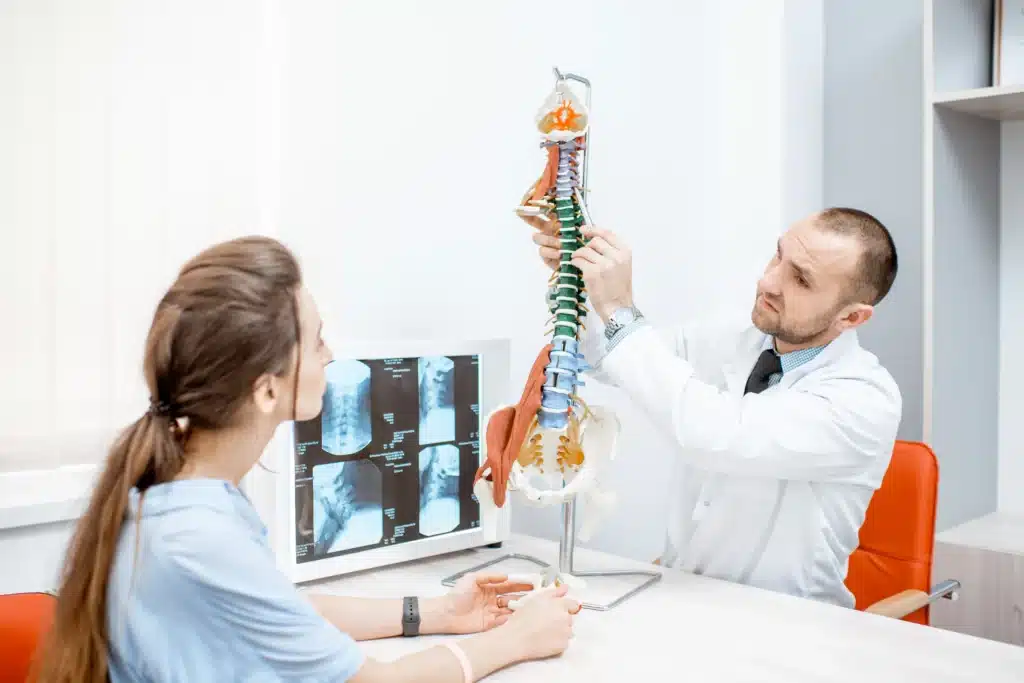
Table of Contents
ToggleAs a spine surgeon with over 25 years of experience in treating various spine conditions, I know how critical it is for patients to understand both the benefits and potential complications of spinal fusion surgery. This procedure involves joining two or more vertebrae in the spine, with the goal of providing stability, reducing pain, or correcting deformities.
At Long Island Neuroscience Specialists, we specialize in spinal fusion surgeries to help patients find relief from chronic pain, nerve issues, and instability that affect their quality of life.

Spinal fusion is a surgical procedure where two or more vertebrae are permanently connected, eliminating movement between them. By doing so, we aim to relieve pain, prevent further damage, or correct spinal deformities.
Whether it’s due to conditions like scoliosis, herniated discs, or degenerative spine diseases, spinal fusion can offer a path toward a more comfortable, stable life. However, like any major surgery, it comes with its share of risks.
In this article, I’ll walk you through the potential complications of spinal fusion, what causes them, and how you can work to prevent or manage these issues for the best possible outcome.
When considering spinal fusion surgery, it’s essential to understand the possible complications that could arise. While spinal fusion can be an effective solution for stabilizing the spine and alleviating pain, it is not without risks.
At Long Island Neuroscience Specialists, we always take time to discuss these risks with our patients so they are well-prepared. Here are some of the most common complications we see:
These complications underscore the importance of careful planning and postoperative care. Our team at Long Island Neuroscience Specialists works diligently to mitigate these risks, utilizing the latest technology and techniques in spine surgery.
Recovering from spinal fusion surgery is a journey, and recognizing potential warning signs can make all the difference. If complications do arise, they often come with clear symptoms.
At Long Island Neuroscience Specialists, we educate our patients on what to look out for so that they can seek help at the earliest signs of trouble. Here are some key symptoms to monitor:
By paying attention to these symptoms, you can help detect potential complications early. It’s crucial not to ignore any warning signs and to maintain communication with your healthcare provider as you progress through recovery.
Prompt action often results in better outcomes and a smoother healing process.

Understanding the underlying causes of spinal fusion complications can help patients prepare for surgery and reduce the risks involved. At Long Island Neuroscience Specialists, we aim to educate our patients on these factors to ensure they make well-informed decisions.
Various factors contribute to complications, including surgical techniques, individual health profiles, and lifestyle choices. Here are some of the primary causes:
Each of these factors contributes to the likelihood of complications, and by addressing them proactively, we can work toward safer, more effective spinal fusion procedures. Our team takes these risks seriously and tailors each treatment plan to the unique needs and health status of our patients.
Prevention is key when it comes to minimizing the risks associated with spinal fusion surgery. At Long Island Neuroscience Specialists, we focus on both preoperative and postoperative strategies to help our patients prepare for and recover from surgery as safely as possible.
Here are some effective preventive measures that can significantly reduce the likelihood of complications:
By following these measures, patients can actively participate in their recovery process. We believe that well-informed patients who engage in these preventive steps are better prepared for a successful spinal fusion outcome.
These practices, combined with a focus on patient education, help us ensure the best possible recovery for each individual. Read more here.

Being aware of potential complications is the first step, but knowing how to respond if they arise is equally important. At Long Island Neuroscience Specialists, we encourage our patients to monitor their symptoms closely and reach out if anything seems unusual.
Here are some actions to take if you suspect a complication:
Taking swift action if complications arise can make a substantial difference in the outcome of your recovery. We always encourage patients to err on the side of caution and keep communication open with their medical team.
Timely responses often lead to better management and resolution of issues. Read more here.
Certain individuals face a higher risk of complications following spinal fusion surgery, often due to factors related to overall health, lifestyle, or prior surgical history. At Long Island Neuroscience Specialists, we take these risks into account when planning surgery and provide personalized guidance for each patient. Here are some common risk factors:
Understanding these risk factors allows us to tailor treatment plans and recovery protocols that align with each patient’s unique needs. By taking a proactive approach and addressing these variables, we work to minimize risks and enhance the success rate of spinal fusion surgeries.
The surgical approach and type of hardware used in spinal fusion can significantly influence the risks and outcomes. As spinal surgeons, we carefully consider these factors when determining the best approach for each patient. Here’s a closer look at how these elements affect the likelihood of complications:
Each of these factors contributes to the risk profile of spinal fusion surgery. By tailoring the approach and hardware to the patient’s specific needs, we work to optimize safety and effectiveness, aiming for the best possible recovery outcomes.
While spinal fusion can provide long-lasting relief, it may also lead to certain long-term complications. At Long Island Neuroscience Specialists, we guide our patients through both the immediate and extended aspects of recovery, ensuring they are prepared for potential issues down the line.
Here are some of the more common long-term complications and ways to manage them:
Each of these complications highlights the importance of long-term care and follow-up. Our approach focuses on proactive management, providing patients with resources and treatments to maintain their quality of life well beyond the initial recovery phase.
Spinal fusion surgery can offer significant relief for patients suffering from chronic pain, instability, or spinal deformities. However, as with any major surgical procedure, there are potential risks and complications to consider.
At Long Island Neuroscience Specialists, we believe that understanding these risks and preparing for them is essential for a successful recovery. From common complications like infections and blood clots to long-term concerns such as adjacent segment disease, being informed can help patients make the best choices for their health.
Our team is dedicated to providing comprehensive care before, during, and after surgery. By focusing on preventive measures and maintaining an open line of communication, we aim to minimize complications and support our patients throughout their recovery journey.
If you’re considering spinal fusion or have questions about the process, we encourage you to reach out. We’re here to help you understand the procedure, address your concerns, and guide you every step of the way toward a safer and healthier spine.
GET IN TOUCH +
285 Sills Road
Building 5-6, Suite E
East Patchogue, NY 11772
(631) 475-5511
184 N. Belle Mead Road
East Setauket, NY 11733
(631) 675-6226
GET IN TOUCH +
285 Sills Road
Building 5-6, Suite E
East Patchogue, NY 11772
(631) 475-5511
184 N. Belle Mead Road
East Setauket, NY 11733
(631) 675-6226
SUBSCRIBE TO OUR NEWSLETTER +
Send us a Google review. Click this link and let us know how we did!
Review us on Yelp too.